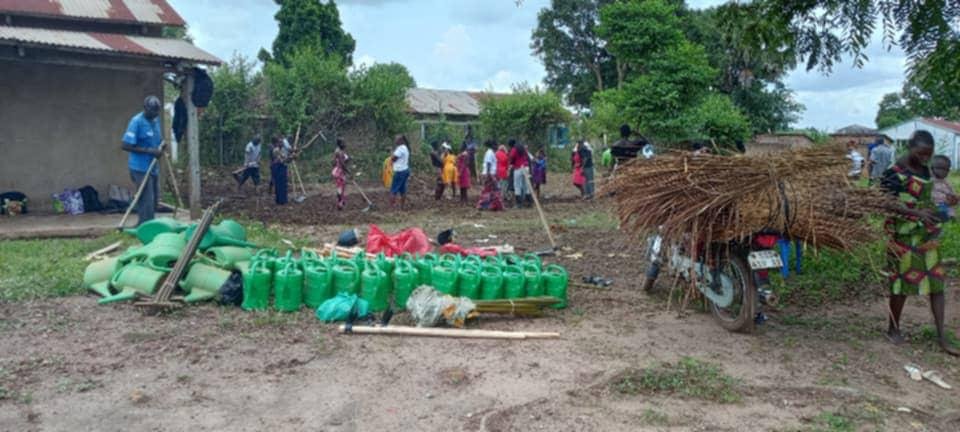In a bold step to tackle hunger and malnutrition among vulnerable groups, people living with HIV (PLHIV) in Western Equatoria State have received farm tools and seeds to help them produce nutritious food for themselves and their families.
The initiative, funded by the World Food Programme(WFP) and implemented by the Star Trust Organization (STO), was launched last week at the Women Empowerment Centre in Yambio.
It aims to strengthen the capacity of PLHIV to improve their diets, prolong their lives, and reduce dependence on aid.
The Governor of Western Equatoria State, Barrister James Al-Taib Berapai, officiated the event his first public engagement since assuming office. He praised the project as a timely intervention for communities that have long battled food insecurity and the stigma surrounding HIV.
“Nutritious food is the foundation of good health, and it begins with a balanced diet,” Governor Al-Taib said. “Our government is committed to supporting food security for everyone, especially people living with HIV.
You are not to blame for contracting the virus. God has a plan for each of us, and you are children of God and vital agents of this country’s development.”
Governor Al-Taib urged all participants to embrace the training as a personal mission: “Strong families, healthy communities, and a productive state begin with you. Work hard, be resilient, and let no one define you by HIV. Define yourself by what you can achieve.”
The Acting Chairperson of the HIV Commission in the state, Mr. Henry Kenyi, said the training drewparticipants from six counties, Mundri East, Mundri West, Maridi, Mvolo, Nzara, and Yambio. He cautioned beneficiaries against misusing the support.
“Do not sell these tools or seeds. Use them wisely to feed your families and maintain a healthy diet. Farming is not just about food, it is about life and dignity,” Kenyi stressed.
The STO Program Coordinator, Mr. Binza Joel, explained that the training was designed to build resilience by teaching PLHIV modern methods of food production.
“This project is about giving people the knowledge and tools to stand on their own feet. If they can grow enough nutritious food, they can live longer, healthier lives and contribute to their communities,” Binza said.
For many of the participants, the program offers more than just farm tools, it offers hope.
Madam Lillian Nabie Michael, who spoke on behalf of the beneficiaries, expressed gratitude for the training and promised to apply the new skills.
“We now know how to balance food for different nutrients and how to farm even on small plots of land. This knowledge will help us fight hunger and live healthier lives. I will also share these skills with my community members,” she said.
Another participant, Mr. Peter Fere, said the support would reduce stigma by enabling PLHIV to be seen as productive members of society.
“For too long, people living with HIV have been viewed as dependent. With these tools, we can prove that we are strong, hardworking, and able to support our families,” he noted.
Western Equatoria State has one of the highest HIV prevalence rates in South Sudan, with health officials estimating that thousands of residents are living with the virus. Many face stigma, discrimination, and challenges accessing proper nutrition and treatment.
Health experts say that without proper diets, people living with HIV are at higher risk of developing complications and may respond poorly to antiretroviral therapy (ART). That makes nutrition projects like this critical for survival.
According to WFP, empowering PLHIV through agriculture helps break the cycle of stigma while ensuring they can live productive and dignified lives.
As the event concluded, beneficiaries left with not just farm tools and seeds but also renewed confidence. For them, the project is more than an aid intervention—it is a lifeline.
